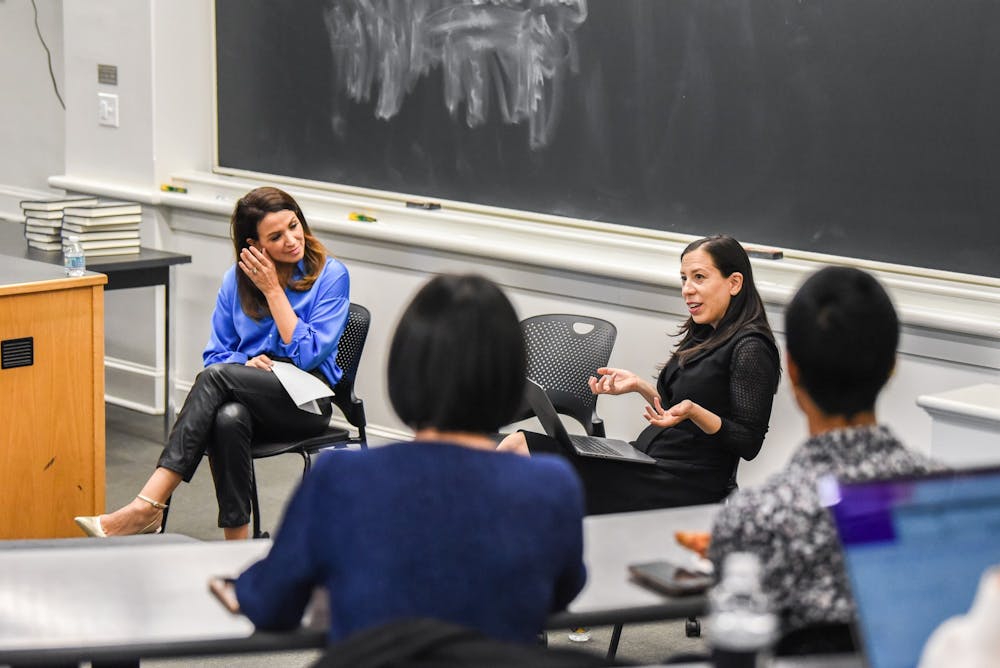Assoc. Media Studies Prof. Aynne Kokas and guest Rebeccah Heinrichs, senior fellow at the Hudson Institute and director of the Keystone Defense Initiative, reviewed and debated Congress’ recent legislation to ban TikTok in the U.S. During the talk Tuesday evening, Kokas provided information about the app’s intake of personal data while Heinrichs urged the audience to delete TikTok, saying it “manipulates” users.
A Congressional ban on TikTok has recently gained support on Capitol Hill, with President Joe Biden demanding that the platform be either sold from its Chinese owners or be prohibited in the U.S. Montana is one signature away from passing a statewide ban on the app with a $10,000 fine for the app and e-stores that permit individuals to download it.
Likewise, Kokas said there are concerns about TikTok’s data gathering and its potential for trafficking personal information across borders. She said the fragile status of the data is amplified by TikTok’s sharing of data not just within the company, but also with outside creditors.
“Because if that company goes bankrupt, then your user data is also an asset that can be sold and distributed in bankruptcy protection,” Kokas said.
TikTok notes in its terms of service that it can share its user data with its parent company, ByteDance. Kokas said ByteDance is a company the Chinese government can use to access corporate data and surveil American citizens who use the app.
Heinrichs agreed, saying TikTok “is a Chinese Communist Party spyware app.” However, according to Heinrichs, the U.S.’s emphasis on self-governance and free speech may create a dilemma for any institutional ban.
Heinrichs also said the Chinese government uses TikTok to amplify what Americans are reading, consuming and watching. The app allegedly tracks its users’ GPS hourly and downloads data the user provided when they installed the app, such as passwords, though TikTok denied some of these claims.
Heinrichs said the lack of transparency should raise concerns for users.
“How are you going to make decisions that are good for yourself if you don't even know what's real?” Heinrichs asked.
At the end of the debate, participants had the opportunity to pose questions to the speakers. A participant asked if deleting TikTok would eliminate the entire dilemma of China’s espionage on the U.S.
Heinrichs said the reason TikTok is being targeted by the government is because of how popular it is. There are uncertainties regarding how TikTok is going to use the collected data and profiles, but the gathering of data from TikTok likely allows China to predict the behavior of countries in a period of conflict and to aim misinformation at those countries’ users. Henrichs similarly encouraged that “we have to start somewhere.”
In China, TikTok is called Douyin.This app has a different digital governance framework than TikTok as it only shows Chinese-based content. On the other hand, TikTok does not show Chinese content to American users.
“When we think about these differences, it’s important to not just focus on China but to focus on how it’s possible to shift governance in the U.S. to protect users,” Kokas said.
Another participant questioned whether banning TikTok in the U.S. would give the government too much power over its residents.
Heinrichs said TikTok demonstrates tension similar to the Chinese spy balloons that recently received criticism for hovering over the U.S.
“You would say the federal government should shoot down a spy balloon flying over our ICBM field,” Heinrichs said. “[China does not] have the freedom to fly over our ICBM field. It’s the same thing. You got a little Chinese spy balloon in your phone.”
Heinrichs said she did not want the government to exhibit excessive power,
“I don’t think there is a constitutional right for these countries to be in the U.S. and steal the data and manipulate the minds’ of young people,” Heinrichs said.







